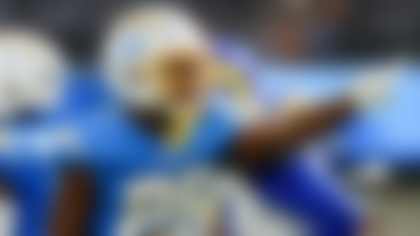NEW YORK -- The 2009 NFL Draft was as much about what didn't happen as it was about what actually took place.
Trade rumors were flying around in the weeks and days leading up to the draft. Many seemed to have substance, particularly with some club representatives publicly acknowledging they were actively seeking to make deals involving specific, high-profile players.
One actually happened: The Buffalo Bills sent unhappy Pro Bowl offensive tackle Jason Peters to the Philadelphia Eagles for the 28th overall choice. And numerous trades were made during both days of the draft -- just none that included players who dominated the pre-draft conversation.
In addition, at least two teams also failed to address glaring draft needs. Here's a list of the top five moves that weren't made during the draft:
[
1. Braylon Edwards remains a Cleveland Brown.
No potential deal received more publicity than Edwards heading to the New York Giants. The trade was never consummated for two major reasons: a) The Giants thought the Browns wanted too much (at least a first-round pick); and b) Edwards was looking for too large of a pay increase (double his salary of $4.55 million). The Giants addressed the wide receiver hole created by the release of Plaxico Burress by using their first-rounder, No. 29 overall, on North Carolina's Hakeem Nicks, an athletic playmaker at 6-foot-1, and a third-rounder on Cal Poly's Ramses Barden, another big-play threat who is even taller (6-6). The Browns still might be open to shipping Edwards to another team, considering they drafted a pair of receivers, too -- Ohio State's Brian Robiskie and Georgia's Mohamed Massaquoi, both in the second round.
[
2. Anquan Boldin remains an Arizona Cardinal.
Cardinals officials spoke openly about the fact that they were willing to entertain offers for their star wide receiver. That prompted rampant speculation that there would be a frenzy of activity with several clubs -- including the New York Giants, New York Jets, Baltimore Ravens, Philadelphia Eagles and Tennessee Titans -- bidding to land his services. But the interest wasn't nearly as great as anticipated. It turned out that the Cardinals received only one offer, a second-round pick from the Chicago Bears (49th overall), and it apparently wasn't good enough for them to part with a key cog in one of the NFL's most explosive passing attacks. Now it doesn't look as if Boldin is going anywhere. Fellow Arizona receiver Larry Fitzgerald and quarterback Kurt Warner say they're willing to do their part and restructure their contracts to help the club renegotiate Boldin's deal to his liking, but that seems like a long shot.
[
3. Julius Peppers remains a Carolina Panther.
Peppers supposedly isn't any happier to be a Panther than he was a couple of months ago. The star defensive end supposedly wants to be traded, and there was at least one team anxious to get him: the New England Patriots. But Peppers gummed up the process by refusing to sign the one-year franchise tender offer the Panthers presented to him. If he did, the Panthers could have attempted to work a trade, although they have insisted all along that Peppers would remain with the team. Another team could have offered Peppers a contract, but then it would have owed the Panthers two first-round draft picks if Carolina didn't match it. Or Peppers' agent could have brokered a trade and taken it back to the Panthers, but that never happened. Peppers' refusal to sign the tender is bizarre, considering he stands to receive nearly $17 million for one season. If he's determined to receive a contract like the record-breaking, seven-year, $100 million package (including $41 million in guaranteed cash) that Albert Haynesworth got from the Washington Redskins, he probably isn't being realistic. Another team isn't likely to pay that to a defensive lineman, and the market for Peppers, whom the Patriots would convert from a 4-3 end to a 3-4 outside linebacker, is more along the lines of the six-year, $51.75 million contract (including $20 million in bonuses) that the Pittsburgh Steelers gave to standout outside linebacker James Harrison.
[
4. The San Francisco 49ers didn't sufficiently address their quarterback need.
Sitting at No. 10, they weren't in position to get Georgia's Matthew Stafford, whom the Detroit Lions made the top overall choice. The New York Jets moved ahead of them, trading with the Browns to go from No. 17 to No. 5 to get USC's Mark Sanchez. The 49ers could have selected Kansas State's Josh Freeman, but instead they took the best receiver in the draft, Michael Crabtree, who surprisingly fell to them after the Oakland Raiders used the seventh pick on Maryland receiver Darrius Heyward-Bey. Freeman ended up going to Tampa Bay at No. 17 after the Buccaneers moved up two spots in a trade with the Browns. The Niners did take a quarterback in the fifth round, Ball State's Nate Davis, but he has a learning disability and doesn't appear to be much more than a practice-squad player. It's hard to believe they'll have much success with Alex Smith or Shaun Hill. If that's the case, at least they'll have some ammunition to select a quarterback from what is expected to be a better pool of quarterbacks in next year's draft. The 49ers will have an extra first-round pick in 2010 thanks to a trade with Carolina in the second round of this year's draft.
[
5. The Bills didn't address their offensive tackle need.
It was widely expected that Buffalo would use one of its two first-round picks on someone to fill the left tackle spot vacated by Peters. But that never happened. The Bills used their first pick, No. 11, on Penn State defensive end Aaron Maybin. That filled an important need, but they passed up on one of the best tackles in the draft in Michael Oher of Ole Miss. Oher was widely viewed as the fourth-best tackle in the draft after Baylor's Jason Smith (No. 2, St. Louis), Virginia's Eugene Monroe (No. 8, Jacksonville) and Alabama's Andre Smith (No. 6, Cincinnati). The Bills determined that it would have been a reach to take Oher 11th overall, and that seemed to be verified by the fact that he wasn't selected until No. 23 by the Baltimore Ravens. The Bills could have gone with a tackle with their next pick, No. 28, and some good ones were available (Arizona's Eben Britton, Oklahoma's Phil Loadholt and Connecticut's William Beatty, all of whom went in the second round). Instead, the Bills made the curious choice of Louisville's Eric Wood, who is listed as a center but will move to guard. Second-rounder Andy Levitre played tackle at Oregon State, but at 6-2, he is not tall enough to do so in the NFL and will have to move to guard.



